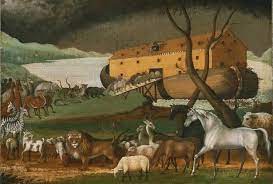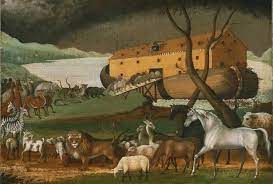
The Sumerian epic of Gilgamesh, which is about a thousand years older than Genesis, has a story about the Flood. Since Abraham was originally from Ur, in Sumer, it shouldn’t surprise us that the story in Genesis is based on the epic of Gilgamesh. The story in Genesis is however superior because it is a myth and has different levels of comprehension, while that in Gilgamesh is a fable with only one level of comprehension. Whereas a myth becomes a fable through the addition or elimination of information, which obscures a better understanding, a fable becomes a myth when it is cleaned up.[1]
According to the chronology in Genesis, the ten patriarchs before Abraham were still alive when he was born. Abraham was 60 when Noah – who may have known Enosh, the grandson of Adam – died. Abraham may therefore have found out, via Noah, what happened before the Flood. [2]
“When Yahweh saw that human wickedness was spreading on the earth and the thoughts of human hearts were evil all the time, He regretted to have made humans on earth, and his heart was deeply troubled. And Yahweh said: ‘I am going to exterminate from the face of the earth the man that I have created, –and with them the animals, from man to cattle, serpents, and even the birds of the sky– for I regret that I have made them.’ But Noah found favour in the eyes of Yahweh.” [3]
“The earth was corrupt in God’s sight and was full of violence. God looked and saw how corrupt the earth had become, because all humans on earth had corrupted their ways. So God said to Noah, ‘I have decided to put an end to all living things, because the earth is full of violence because of them. Therefore, I am going to exterminate them and the earth.’ [4]
This information about human’s wickedness appears just after Yahweh’s comment: “My spirit will not remain forever in man, because he is nothing but flesh; may his days be 120 years. ” Genesis associates the wickedness of man with the high ages that they achieved by sacrificing their first-born.[5]
Genesis suggests that by sacrificing a first-born son, his father could add the years that his son had been going to live to his own life. Then, to extend his life time even more, he had to convince his other children to do the same and sacrifice their firstborn sons. The person who invented this tradition thus began a pyramid scheme.
None of the patriarchs managed to extend his age beyond 840, or 7 x 120, the age that Kenan lived to after he begat Mahalalel. If in the days of paradise there was a limited number of people on Earth –living in harmony with others requires living in harmony with Earth, since it supplies the resources that are needed– this would explain why this pyramid scheme was destined to collapse. This is what happened during the Flood.
If we are to understand that Genesis recognizes the fact that a society that doesn’t live in harmony is destined to destroy itself, we must reflect upon mankind’s evolution. The invention of nuclear weapons allows us not only to conclude that we are capable of putting an end to our civilization, but also that a society that doesn’t live in harmony is destined to destroy itself. Genesis tells us this: 10 generations after the end of harmony (the expulsion from paradise), because of a change of diet (eating the forbidden fruit), a great catastrophe (the flood) put an end to almost all of humanity.
Inventions continually became more sophisticated and allowed a smaller and smaller percentage of the world’s population to appropriate a larger percentage of all resources. As this increases the tension between different groups of people, and between people and their environment, it is only a matter of time before a great catastrophe ends our civilization. While little by little our industry makes our habitat less inhabitable, a nuclear war would cause a terrible damage in very little time.
The idea that a society that doesn’t live in harmony is destined to destroy itself affects our understanding of the universe and our understanding of the Bible. It encourages us to ask a wide variety of questions: How would a nuclear war affect our climate? Would these explosions damage the atmosphere in such a way as to cause a worldwide flood? If only a few couples survive, would that civilization collapse when people suddenly have to deal with more primitive problems? Is it possible that mankind destroyed itself in the past? Was the Bible written by someone who discovered that mankind had destroyed itself in the past? Was the Bible written to help prevent our self-destruction?
This paradigm allows us to realize that the most relevant question about extra-terrestrial life is whether its inhabitants live in harmony. If they do, they have a good reason to avoid contacting us. If they don’t, we may have a good reason to avoid contacting them.
In case aliens look like us, but are less intelligent or weaker, it is to be expected that we will enslave them or use them as cheap labour; if they don’t look like us, we will eat them, since that is how we have behaved until now. If they are more intelligent or stronger than us, we can expect them to behave similarly.
Reflecting on extra-terrestrial life encourages us to have empathy with other human beings and other creatures. Such reflections enable us to see that, instead of following the policy of eating or being eaten, exploiting or being exploited, abusing or being abused, it makes more sense to follow the golden rule: not to harm but to help others.
Paradise –living in harmony– is not a communist state in which everyone is forced to share their wealth, but a state in which everyone has empathy and follows the golden rule.
Not living in harmony entails struggling for resources to appropriate the maximum of material wealth, regardless of whether others have enough resources to survive.
Assuming that harmony on Earth is utopia entails considering that our society is destined to destroy itself. It also entails ignoring the idea that everything in the universe is governed by the principle of cause and effect. According to this principle, there must be a reason why people are bad or behave evilly. If there are circumstances that make people bad or behave evilly, we can alter them to stop this from happening. Assuming that living in harmony is impossible demonstrates that one doesn’t understand the God of the Bible and one doesn’t understand why this book was written.
What we understand of the universe interacts with what we understand of the Bible. Only after we reflect upon eternity and periods of construction alternating with periods of destruction can we realize that a very old book, apart from telling us about what happened in the past, can warn us of what may happen in the future.
While reading the Bible helps us to realize that a society that doesn’t live in harmony is destined to destroy itself, being aware of this idea helps us to understand the Bible.
Genesis indicates that something very serious happened with the universe during the flood: before that date it doesn’t mention the names of the major celestial bodies or refers to months, and there is a mention of days that become 120 years.
The chronology of the flood is striking, since it mentions for the first time a date based on months, and refers to several periods of 7 days, 40 days and one of 150 days that allows us to discover that its months had 30 days. However, with our current calendar there are also 150 days from February 27 to July 27, although not every month has 30 days.
In the story of the flood, the number 40 appears for the first time: it rained for 40 days and 40 nights. Further on in the Bible we find that Isaac was 40 years old when he took Rebekah as his wife; that Esau was 40 years old when he took Judith as his wife; that people in Egypt spent 40 days embalming Joseph (Jacob’s son); that Moses spent 40 days and 40 nights on the mountain before receiving the 10 commandments; that the Jews stayed 40 years in the desert; and that Jesus fasted for 40 days and 40 nights.
BIBLE REFERENCES: [1] Gn10:28-31 / [2] Gn9:28.29 / Gn11:10-32 / [3] Gn6:6-8 / [4] Gn6:11-13 / [5] Gn6:3
The next 10 articles are:
10 PHILOSOPHY versus THEOLOGY 0 Noah
11 PHILOSOPHY versus THEOLOGY 0 Evil since childhood
12 PHILOSOPHY versus THEOLOGY 0 Repopulating the Earth
13 PHILOSOPHY versus THEOLOGY 0 The tower of Babel
14 PHILOSOPHY versus THEOLOGY 0 An only language
15 PHILOSOPHY versus THEOLOGY 0 Whores
16 PHILOSOPHY versus THEOLOGY 0 20 patriarchs
17 PHILOSOPHY versus THEOLOGY 0 Abraham and Sarah
18 PHILOSOPHY versus THEOLOGY 0 Melchizedek
19 PHILOSOPHY versus THEOLOGY 0 Circumcision

